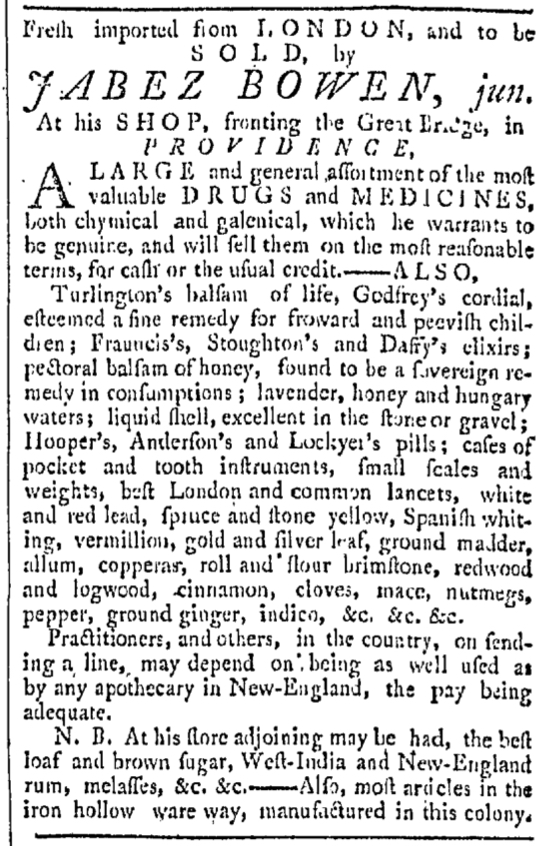What was advertised in a colonial American newspaper 250 years ago today?

“Practitioners, and others, in the country, on sending a line, may depend on being as well used as by any apothecary in New-England.”
Jabez Bowen, Jr., inserted an advertisement promoting his “LARGE and general assortment of the most valuable DRUGS and MEDICINES, both chymical and galenical,” in the November 28, 1767, edition of the Providence Gazette. In it, he listed a variety of popular patent medicines as well as medical equipment, all of it stocked “At his SHOP, fronting the Great Bridge, in PROVIDENCE.” Realizing that the Providence Gazette circulated far beyond that port, Bowen included a note to “Practitioners, and others, in the country” who might not be able to visit his shop themselves. He offered a mail order service, promising that “on sending a line, [they] may depend on being as well used as by any apothecary in New-England, the pay being adequate.”
Bowen knew that he faced competition from other apothecaries, not only those from Providence but also others from Boston, a much larger city. Those competitors distributed their advertisements throughout New England and beyond via four newspapers, giving them another advantage over Bowen. Although shopkeepers sometimes advertised that they served customers “in the country” when they sent orders by mail, apothecaries most regularly incorporated this marketing strategy into their advertisements. In his attempts to operate a prosperous business, Bowen also participated in this practice, proclaiming that he would not be overshadowed by competitors from Providence, Boston, or anywhere else. His customers could “depend on being as well used as by any apothecary in New-England.” In making this claim, Bowen offered both service and value to prospective customers.
Yet he also made clear that he aimed to establish commercial relationships mutually beneficial to both parties. He qualified his pledge that customers would be “as well used as by any apothecary” with the caveat of “the pay being adequate.” He was not so desperate for business that he would allow customers to take advantage of him. Bowen sold his medicines and supplies “on the most reasonable terms,” but expected clients to acknowledge the value of his wares and the service he provided in packaging orders and dispatching them to “the country.” In so doing, he indicated that he was as professional and as competent as his counterparts in Boston, capable of delivering on the promises he made in his advertisements.
